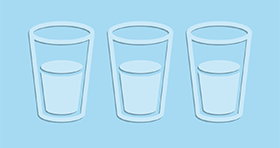It is an accepted fact in the medical community that the principal effect perchlorate has on the human body is limited to the thyroid gland.
Perchlorate is safe at environmental levels, no study has shown that perchlorate causes adverse effects on human health, and perchlorate has no measureable effects at levels below 245 parts per billion (ppb) in water. Because perchlorate is not stored in the body, effects above this level, if they occur, are temporary and non-adverse – the body adapts naturally.

Safe Exposure Levels
At the request of the U. S. Environmental Protection Agency (EPA), the National Academy of Sciences (NAS) convened a world-class panel of experts to review 50 years of research on perchlorate. The panel determined in 2005 that the safe exposure level of perchlorate for all populations, even the most sensitive, is 0.0007 milligrams per kilogram per day, about 24.5 ppb in water.

Drinking Water
U.S. EPA conducted a study in 2005 to help determine the occurrence of perchlorate in water across the country. It found that more than 98 percent of perchlorate detections in U.S. water systems are below 4 ppb — a level 60 times lower than the recognized No Observed Effect Level.

Food
In the human body at high doses, perchlorate can compete with iodine, which the thyroid gland uses to make hormones. This effect is called iodide uptake inhibition, or IUI, and this effect is not adverse. Notably, in its 2005 report, the National Research Council of the National Academies of Science (NAS) in the United States confirmed that IUI is not an adverse health effect, and that adverse effects of perchlorate exposure are only theoretical and have not been demonstrated in humans. There is little or no likelihood that dietary perchlorate intake could result in adverse health effects, since sufficient iodine intake reduces any effects perchlorate may have on the human thyroid. In its 2008 Total Diet Study, the FDA found that dietary iodine in the U.S. consistently exceeded current Estimated Average Requirements.

Health
It is an accepted fact in the medical community that any effect the chemical perchlorate may have on the human body is limited to the thyroid gland. Studies have also been conducted specifically around cancer, the thyroid, and pregnancy and fetuses, and have found no negative health impact from perchlorate exposure.

Myths vs. Facts
There are many misconceptions about perchlorate and human health impacts. Separate the facts from fiction with findings and conclusions from trusted scientific experts.
